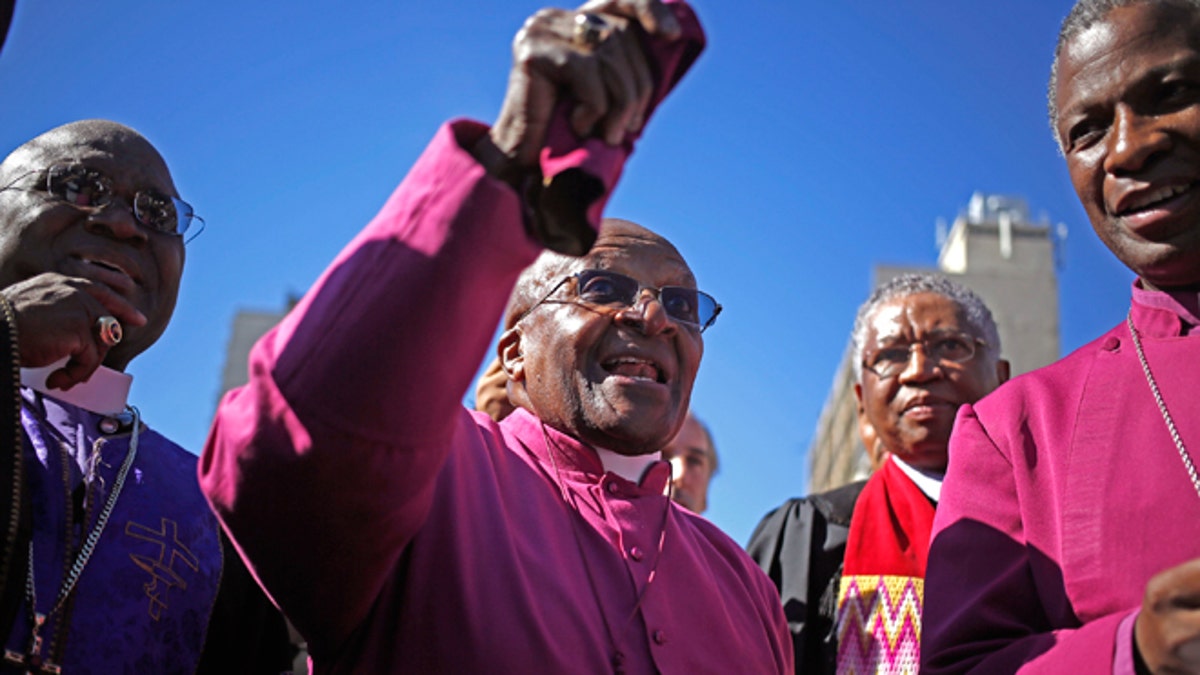
April 19, 2014: South African Archbishop Desmond Tutu, center, speaks after he marched in a rally with other religious leader under the banner of 'A Call to Witness' to parliament in the city of Cape Town, South Africa.“How can you describe falling in love?” That is how retired archbishop Desmond Tutu this week recalled the joy of voting in South Africa’s first all-race elections on April 27, 1994, an exultant moment when a population torn by racial conflict stepped out of the shadow of the white minority rule known as apartheid. (AP Photo/Schalk van Zuydam)
Editor's note: We all need to forgive, and there are many of us who need forgiveness. The question is, how do we forgive? In their new book, "The Book of Forgiving," Archbishop Tutu and his daughter Mpho Tutu share their experiences, the stories of others who have inspired them, and what they have learned about the process of forgiving, to help all of us learn the answer to this. And, they are calling YOU to join the Tutu Global Forgiveness Challenge, to join them in undertaking the path for healing ourselves and our world.
Forgiveness: Are we there yet? I wish I knew the answer to that question, but no one can answer it for anyone else.
Forgiveness can be quite short, happening in a matter of minutes, or it can take years to travel the Fourfold Path. It very much depends on the nature of the hurt and the unique story of situation and emotion. No one has the right to tell you how quickly you should walk this path. All we can say is that the path awaits you when you are ready.
As you walk the path with the intention to forgive, you will come to understand more deeply the gift you are asking of and bestowing upon another when you ask a person to forgive what you have done. The power of this practice, the power of this path, is that we heal both as we forgive and as we are forgiven. We heal as we forgive others and as we forgive ourselves.
[pullquote]
Forgiveness feels as if a weight has been lifted off you and you are free to let go of the past and move forward in your life. It may not be found in a single act of grace or a simple string of words, but rather in a process of truth and reconciliation.
Linda Biehl, the mother of murdered Fulbright scholar Amy Biehl, spoke of meeting and then working in the Amy Biehl Foundation with the men who killed her daughter. “I have forgiven them,” she says. “Every day I wake up and my daughter is dead. Most days I wake up and I have to face her killers. Some days I have to forgive them all over again.”
The Fourfold Path is a conversation that begins with a personal choice to heal and be free, a choice to seek peace and create a new story.
We sit in the midst of our hurt and loss, and we face the choice of which path to take: retribution or reconciliation.
We can choose to harm or we can choose to heal. It does not matter how long we have carried our suffering or how briefly.
It does not matter whether the other person is contrite or remorseless.
It does not matter if the one who harmed us does not acknowledge or admit the harm.
It does not matter if we believe that person has not paid for his or her crimes against us, because, as we have said, forgiveness is not a choice you make for someone else; it is a choice you make for yourself.
Forgiveness is rarely easy, but it is always possible.
Excerpted from "The Book of Forgiving," by Archbishop Desmond Tutu and Reverend Mpho Tutu, reprinted with permission by HarperOne, an imprint of HarperCollins Publishers. Copyright 2014.
To sign up for the Tutu Global Forgiveness Challenge, visit forgivenesschallenge.com.








































